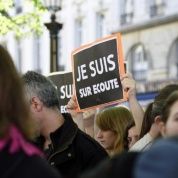The government in France exploited the post-Charlie Hebdo atmosphere of fear to push through expansive surveillance reforms dangerously expanding its intelligence services' powers – a reform planned since at least a parliamentary report released in the summer of 2013.

The legislation, overwhelmingly approved by the National Assembly on Tuesday, is expected to be implemented without many amendments despite the strong opposition of various human rights groups. President President Francois Hollande imposed a fast track procedure on the bill which limits the time for debate in Parliament and restricts the ability for lawmakers to add ammendments.
Related: French Police Interrogate Child for 'Apology for Terrorism'
State officials defending the bill focused their support on terrorism, arguing that it will finally provide the tools necessary to address terrorist attacks with a legal framework formalizing practices the intelligence services had to carried out illegally so far, as President Hollande unexpectedly admitted in 2013.
Moreover, the law will not just target terrorism, as suggested by the government, but also industrial spying, or even more worrying “the prevention of assaults against the Republican nature of institutions, collective violence that could affect national security,” a very vague and encompassing notion threatening to include any social movement, demonstration or activist group.
RELATED: Myths about Terrorism and Islam in Western Europe
The scope of surveillance permitted also becomes much more intrusive: intelligence services will be able to set up listening devices in people’s residences or GPS systems in vehicles, listen to phone conversations, or set up IMSI catchers – devices that capture phone information within a 500 km radius – without a judge's authorization.
Internet surveillance will have almost no limits, as agencies will be able to collect big data (not the content of the message itself, but who sends it to whom, etc.) of any electronic conversations. It will also be put under surveillance from the internet source, as “black boxes” will be set up at Internet Access Providers and Web Hosts in order to monitor the whole traffic; then an algorithm will detect any “suspect behavior” - a notion that is not defined in the legislation - and immediately send an alert to intelligence services.
Regarding checks and balances, the law practically lacks any, as a national administrative commission created for oversight has only been granted a consultative role, while the real decision-making authority will be concentrated in the hands of Prime Minister Manuel Valls.
RELATED: Myths about Terrorism and Islam in Western Europe
Although Prime Minister Valls, when he announced the bill one day after the Charlie Hebdo's attacks, denied it will be a “a French Patriot Act,” referring to a U.S. national security law, the National Commission on Informatics and Liberty (CNIL) warned it was actually dangerously similar. Just like for the NSA, the French bill allows the country’s agency to monitor suspects and any person who contacts him or her. In this sense the legislation targets not only terrorism but what could be considered “pre-terrorism,” based on the notion of the presumption of guilt.
Although surveys have revealed that the majority of French population seem to agree with the law following the shock produced by Charlie Hebdo's attacks, prominent public figures and human rights groups have spoken up against the legislation - including anti-terrorist Judge Marc Trevedic, the country’s main unions of magistrates and lawyers, the online freedom advocacy group La Quadrature du Net, the League of Human Rights, Reporters Without Borders, and the National Commission on Informatics and Liberty, among others. Judge Trevedic explained in an interview with RTL channel that the law was way too vague and therefore is potentially harmful for democratic institutions in the hands of misguided or malevolent governments.
RELATED: French Prime Minister: 'There Is Ethnic Apartheid in France'
The effectiveness of such policies is also dubious, as the two attacks proved in January. Minister of the Interior Bernard Cazeneuve claimed repeatedly that 90 percent of the youth who fell into terrorist activities in the European Union first radicalized online. However, while this figure was extracted from a study based on a small sample of 160 families, this is forgetting that Kouachi brothers were radicalized in jail – where the lack of moderate imams keep from countering other discourses, affirms human rights groups. The Kouachis had also been wiretapped for months, obviously in vain, as they managed to kill 12 people at the Charlie Hebdo offices, while Amedy Coulibaly who attacked the kosher supermarket was reported to the intelligence services after a police control one week before he killed six people in the Paris suburb of Montrouge.
RELATED: French Assembly Approves Bill Expanding Domestic Surveillance